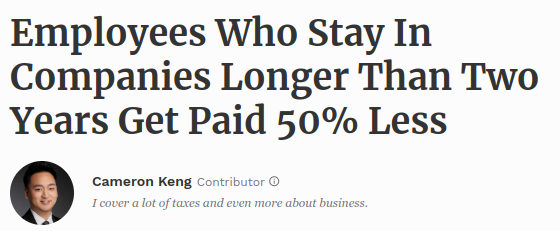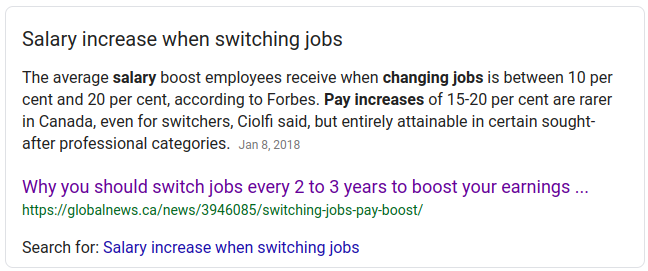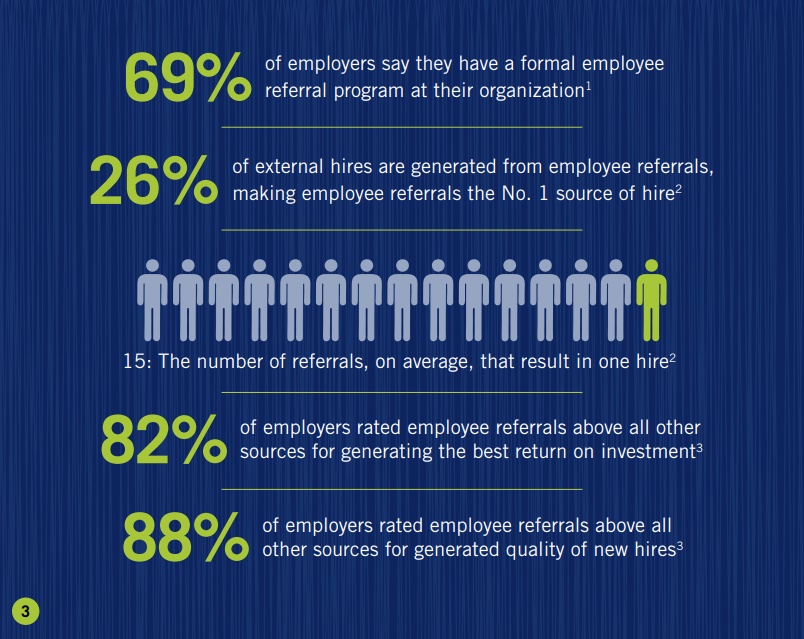Want to make more money? Boost your salary by doing this one thing
How can you make more money? Changing jobs statistically results in a greater increase in salary than sticking it out at one place.

I didn't retire at 35 because I sat still in a cubicle all day and lamented the fact that I wasn't paid enough or that my work sucked. Few of us get ahead by doing that. Instead, people make more money when they do this one very important thing.
It's not just "working hard". Yes, hard work does make a difference. Being a team player helps. All the basic things that you hear about from career coaches (and maybe even your parents) can and do work.
But, there's something else that worked far better in my career.
It's a technique that requires a little more work (and perhaps risk), but if you're the type of person who quickly grows restless with routine, this might actually knock out two birds with one stone.
Make more money by changing jobs
Out of curiosity, I pulled up Google and started typing in a search query: "make more money by". I let Google fill in the blank with whatever it felt was most appropriate based on what people are looking for.
And - Google is smart. It knows what people are searching for. It also seems to piece together wisdom from our society, based on patterns and gathered intelligence, that will probably help the majority of the people.
And, this situation was no different. Check out the first suggestion:

Throughout my career, I made much more money by changing jobs than I ever did asking for raises or working harder in my current position.
Every move that I made netted a 10 to 15% increase in pay - minimum, which is typically far higher than the base cost-of-living raises that the majority of us get each year.
And, some of us don't get yearly raises at all.
Among businesses who do give raises, the average is between 4 and 5%. It's better than nothing but doesn't compare to the raises I got by changing jobs.
And, it seems that I'm not the only one who's seen this.

"Staying employed at the same company for over two years on average is going to make you earn less over your lifetime by about 50% or more," wrote Cameron Keng at Forbes. That's a huge potential difference.
"Why are people who jump ship rewarded, when loyal employees are punished for their dedication? The answer is simple. Recessions allow businesses to freeze their payroll and decrease salaries of the newly hired based on “market trends.”"
Interesting.
Whatever the reason, changing jobs on the regular made a clear and convincing difference in my earnings over the years - earnings I used to achieve financial independence and retire early, and it could make a difference in yours as well.
But, there are risks that need to be calculated into this equation. Let's take a look at both the benefits as well as the risks of changing jobs below.
The benefits of changing jobs
In my career, the primary benefit was earning more money. Every change came pre-installed with at least a 10% boost in earnings. And, my last position allowed me to work 100% from home, which was a huge benefit to my working career.
But, that's not the only benefit to changing jobs.
An increase of your salary
As I said, the first and primary reason I changed jobs was to boost my earnings. The numbers clearly show that changing jobs results, on average, in a greater boost to earnings than sticking it out at one place for long periods of time.
And, this phenomenon is true outside of the United States, too.

But, the benefits go beyond just money.
A change of scenery
In my case, I grew tired of the same ol' routine, day in and day out. Even if I liked the job, I eventually got tired of the monotony of it all. For many of us, changing jobs just means a refreshing change of scenery.
And, this includes the people we work with too.
Over the course of my career, I have worked with some amazingly talented people, folks who could code me under the table, solve complex math quickly and accurately (the first time), design incredibly innovative solutions and answer almost any question – even questions that they did not truly have the answer to, with confidence.
I soaked up as much as I could from these people.
And, I observed how they acted, how they spoke, how their mind worked when pondering something complex. I asked them questions – lots of them. I indebted myself to their experience and influence within the organization.
I’ve learned a ton this way, and moving around within my industry helped expose me to a wide variety of people, each with their own set of strengths from which I could learn.
Expanding your network
New jobs mean new people, and over the course of my career, experience has shown that the size of our network - not just the size of our brains and our level of knowledge, makes the biggest difference in opportunities and getting ahead.
And now that I think about it, I have only worked for companies whom I was personally referred to by a respected member already within that organization.
Yup, every time – to include my FIRST job straight out of college with the help of my dad. Your network is so important.
The opportunities you get through your network will likely far outweigh those directly from your knowledge or experience, or by applying for a job “cold” at another organization. Job referrals are more important than ever before.
In fact, job referrals are becoming one of the most common ways workers get jobs. Career Builder has published an in-depth study of job referral programs.
From Page 3 of Career Builder's PDF:

Referral programs help to lower an organization's recruiting budget, boost the likelihood of hire and reduce the time it takes to find the right talent.
Exposure to new systems
Similar to expanding your network, changing jobs exposes you to new systems and processes. New software packages. New ways of doing business. The more exposed you become to different ways of business, the better equipped you'll be, especially later on in your career, to approach virtually any problem with experience and wisdom.
For example, a few years ago (back when I worked full-time) I got to spearhead and implement a brand new IT helpdesk tracking system as the Director of IT at a not-for-profit in Tucson, along with assisting to put in place an “agile development process” for their development staff…but only because the organization I worked at before that already used the agile development process and exposed me to its inner workings and how the pieces fit together.
The risks of changing jobs
Certainly, it's far too easy to just say that changing jobs will always result in more money. Life is much too organic of a creature to treat it like that. There's a LOT that goes into making the best decisions for our lives, and this is certainly no exception.
Clearly, there are times when switching jobs may not be the best course of action.
For example:
- The job market is weak
- You're close to retirement
- You're a year away from a pension
- You fear too many jobs on your resume
The decision to change jobs to make more money is a deeply personal one. And certainly, it won't always work. For example, a weak job market could make searching for another job more trouble than it's worth. Salaries may also be lower in a weaker market even if you do find another position.
And, some industries might perceive too many companies on resumes as a sign that you're one of those "short-timers", which might reduce the chances of a call-back.
Also, it's possible that many organizations are built around the concept of longevity and reward employees handsomely if they stick around long enough. Naturally, we need to look at our own scenario and decide for ourselves what works best.
But, changing jobs to make more money should be an option that's on the table if you are looking to boost your income.
What about you?
How many times have you changed jobs in your career? Did you see a nice boost to your earnings each time you accepted another position?